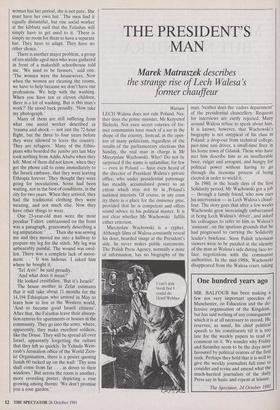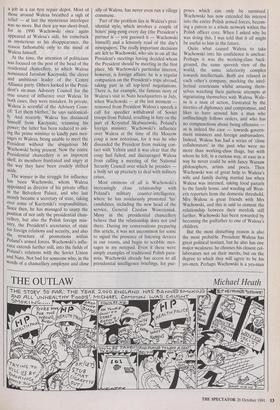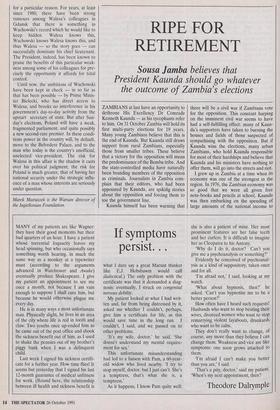THE PRESIDENT'S MAN
Marek Matraszek describes
the strange rise of Lech Walesa's former chauffeur
Warsaw LECH Walesa does not rule Poland. Nei- ther does the prime minister, Mr Krzysztof Bielecki. Not even secret coteries of for- mer communists have much of a say in the shape of the country. Instead, in the opin- ion of many politicians, regardless of the results of the parliamentary elections this Sunday, the real man in charge is Mr Mieczyslaw Wachowski. Who? Do not be surprised if the name is unfamiliar, for few — even in Poland — have even heard of the director of President Walesa's private office, who under presidential patronage has steadily accumulated power to an extent which may not be in , Poland's national interests. Of course, in any coun try there is a place for the eminence grise, provided that he is competent and offers sound advice to his political master. It is not clear whether Mr Wachowski fulfils either criterion.
Mieczyslaw Wachowski is a cypher. Although films of Walesa constantly reveal his dour, bearded visage at the President's side, he never makes public statements. The Polish Press Agency, normally a mine of information, has no biography of the man. Neither does the 'cadres department' of the presidential chancellery. Requests for interviews are curtly rejected. Many around Walesa refuse to speak about him. It is known, however, that Wachowski's biography is not untypical of his class in Poland: a drop-out from technical college, part-time taxi driver, a small-time fixer in his home town of Gdansk. Those who have met him describe him as an insufferable boor, vulgar and arrogant, and hungry for political power without having to go through the tiresome process of being elected in order to wield it.
In 1980, in the heady days of the first Solidarity period, Mr Wachowski got a job — through a family friend, who now rues his intervention — as Lech Walesa's chauf- feur. The story goes that after a few weeks Wachowski grew increasingly embarrassed at being Lech Walesa's 'driver', and asked his colleagues to refer to him as Walesa's `assistant', on the spurious grounds that he had progressed to carrying the Solidarity leader's briefcase. Soon Polish television viewers were to be puzzled at the identity of the man at Walesa's side during face-to- face negotiations with the communist authorities. In the mid-1980s, Wachowski disappeared from the Walesa court, taking a job in a car tyre repair depot. Most of those around Walesa breathed a sigh of relief — at last the mysterious interloper was no more. But their joy was short-lived, for in 1990 Wachowski once again appeared at Walesa's side, his comeback as mysterious as his disappearance, the reason fathomable only to the mind of Walesa himself.
At the time, the attention of politicians was focused on the post of the head of the residential chancellery, to which Walesa nominated Jaroslaw Kaczynski, the clever and ambitious leader of the Centre Alliance party. Others looked to the Presi- dent's six-man Advisory Council for the true source of influence over Walesa. In both cases, they were mistaken. In private, Walesa is scornful of the Advisory Coun- cil: let them blether,' he says sardonical- ly. And recently, Walesa has distanced himself from Kaczynski, trimming his Power; the latter has been reduced to ask- ing the prime minister to kindly pass mes- sages to Walesa, being unable to meet the President without the ubiquitous Mr Wachowski being present. Now the entire Presidential chancellery is an impotent shell, its members frustrated and angry at the way they have been crudely shifted aside.
The winner in the struggle for influence has been Wachowski, whom Walesa appointed as director of his private office in the Belvedere Palace, and who last month became a secretary of state, taking over some of Kaczynski's responsibilities. Since then, he has managed to usurp the position of not only the presidential chan- cellery, but also the Polish foreign min- istry, the President's secretaries of state for foreign relations and security, and also the structure of promotions within Poland's armed forces. Wachowski's influ- ence extends further still, into the fields of Poland's relations with the Soviet Union and Nato. Not bad for someone who, in the words of a chancellery employee and close ally of Walesa, has never even run a village commune.
Part of the problem lies in Walesa's pres- idential style, which involves a couple of hours' ping-pong every day (the President's partner is — you guessed it — Wachowski himself) and a leisurely read of the day's newspapers. The really important decisions are left to Wachowski, who sits in on all the President's meetings having decided whom the President should be meeting in the first place. Mr Wachowski's particular interest, however, is foreign affairs: he is a regular companion on the President's trips abroad, taking part in all top-level negotiations. There is, for example, the famous story of Walesa's visit to Nato headquarters in July, when Wachowski — at the last moment removed from President Walesa's speech a call for speedier withdrawal of Soviet troops from Poland, resulting in fury on the part of Krzysztof Skubiszewski, Poland's foreign minister. Wachowski's influence over Walesa at the time of the Moscow coup is now notorious, for it was he who dissuaded the President from making con- tact with Yeltsin until it was clear that the coup had failed, and discouraged Walesa from calling a meeting of the National Security Council over which he presides a body set up precisely to deal with military crises.
Most ominous of all is Wachowski's increasingly close relationship with Poland's military counter-intelligence, where he has assiduously promoted 'his' candidates, including the new head of the service, General Czeslaw Wawrzyniak. Many in the presidential chancellery believe that the relationship does not end there. During my conversations preparing this article, it was not uncommon for some to signal the presence of listening devices in our rooms, and begin to scribble mes- sages in my notepad. Even if these were simply examples of traditional Polish para- noia, Wachowski already has access to all presidential intelligence briefings, for pur-
poses which can only be surmised. Wachowski has now extended his interest into the entire Polish armed forces, becom- ing a patron to a whole network within the Polish officer core. When I asked why he was doing this, I was told that it all might be useful to him in the future.
Quite what caused Walesa to take Wachowski into his confidence is unclear. Perhaps it was the working-class back- ground, the same spiwish view of the world, the same inferiority complex towards intellectuals. Both are relaxed in each other's company, mocking the intel- lectual courtesans whilst amusing them- selves watching their pathetic attempts at ingratiating themselves with Walesa. Wale- sa is a man of action, frustrated by the niceties of diplomacy and compromise, and likes to have around him a man who unflinchingly follows orders, and who has no compunctions about being offensive as is indeed the case — towards govern- ment ministers and foreign ambassadors. Indeed, Walesa has had a series of 'close collaborators' in the past who were no more than working-class thugs, but with whom he felt, in a curious way, at ease in a way he never could be with fancy Warsaw philosophers, artists and poets. Then Wachowski was of great help to Walesa's wife and family during martial law when Walesa was interned, taking food parcels to the family home, and warding off West- ern reporters from the domestic threshold. Mrs Walesa is great friends with Mrs Wachowski, and this is said to cement the relationship between their menfolk still further. Wachowski has been rewarded by becoming the godfather to one of Walesa's children.
But the most disturbing reason is also the most probable. President Walesa has great political instinct, but he also has one major weakness: he chooses his closest col- laborators not on their merits, but on the degree to which they will agree to be his yes-men. Perhaps Wachowski is a yes-man
for a particular reason. For years, at least since 1980, there have been strong rumours among Walesa's colleagues in Gdansk that there is something in Wachowski's record which he would like to keep hidden. Walesa knows this, Wachowski knows Walesa knows this, and thus Walesa — so the story goes — can successfully dominate his chief lieutenant. The President, indeed, has been known to praise the benefits of this particular weak- ness among some of his colleagues for pre- cisely the opportunity it affords for total control.
Until now, the ambitions of Wachowski have been kept in check — in so far as that has been possible — by Prime Minis- ter Bielecki, who has direct access to Walesa, and brooks no interference in his government's day-to-day activity from the upstart secretary of state. But after Sun- day's elections, Poland will have a weak, fragmented parliament, and quite possibly a new second-rate premier. In these condi- tions power in the country will, by default, move to the Belvedere Palace, and to the man who today is the country's unofficial, unelected vice-president. The risk for Walesa in this affair is the shadow it casts over his political judgment; the risk for Poland is much greater, that of having her national security under the strategic influ- ence of a man whose interests are seriously under question.
Marek Matraszek is the Warsaw director of the Jagiellonian Foundation.










































 Previous page
Previous page